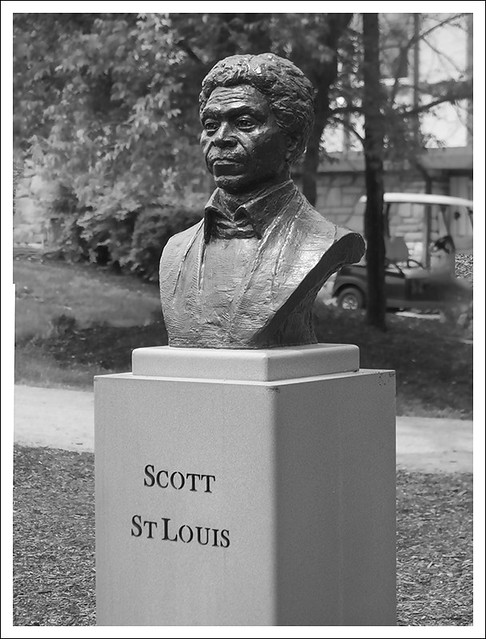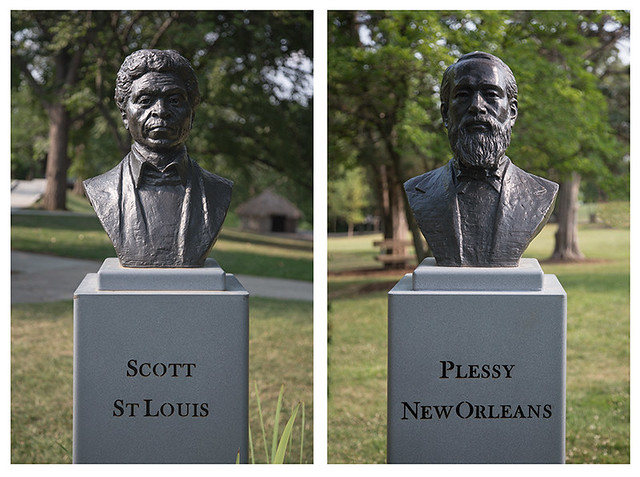
Most Americans have heard of Dred Scott but not many of us know the meaning of the U.S. Supreme Court decision that bears his name. The case was about the status of enslaved people who had
been held captive while residing in a free state. Those states and
territories held that a slaveholder forfeited his property rights to his
enslaved individuals within their boundaries and where there was no law to support his controlling the slave.
Congress had never before addressed whether slaves were free if they
set foot upon free soil. Scott, a slave of an army surgeon. moved with his family between free and slave territories with his owner's military postings.
Scott eventually sued for freedom in St. Louis. The case found its way to the Supreme Court which, in a notorious decision made in 1857, ruled that no person of African ancestry could claim citizenship in the United States and had no right to bring suit in its courts. The outrage over the decision was one of the factors that lead to the Civil War.
This bust is located in our Laumeier Sculpture Park. Scott died in St. Louis in 1858 at the age of 59.
Dred Scott v. John F. A. Sandford, 60 U.S. 393 (1857). Homer Plessy v. John Ferguson, 163 U.S. 537 (1896). Two of the worst decisions in the history of the United States Supreme Court. (There are those of us who think they are not through trying.) The first one ruled that people of African descent, whether slave or free, could not be citizens and therefore could not file suit in federal court. The second established the notorious "separate but equal" principle, legalizing institutional discrimination against black people, until it was repudiated by the Court in 1954. The details are too complex for this blog but you can read an excellent summary of the Scott case here and Plessy here. Together, they mark the worst of legalized racism in this country.
At Laumeier Sculpture Park, Scott and Plessy, depicted by identical style busts and pedestals, gaze at one another. Canadian (!) sculptor Ken Lum created The Space Between Scott and Plessy. Click the link to see for yourself.
This is what we call the Old Courthouse. It's been seen in these pages many times before but rarely from this angle. You can spot it in the left mid-ground of yesterday's picture.
In the 1850's, the building was the venue for what we call the Dred Scott case. The decision on the final appeal is widely considered the worst decision in the history of the U. S. Supreme Court (although there are many competitors). If you would like to find out why click here.
 This is the front of the Old Court House downtown. It was in active use from 1845 to 1930 and is now a museum. Its functions were gradually taken over by the Civil Courts Building (see May 16 post). Several more pictures are here.
This is the front of the Old Court House downtown. It was in active use from 1845 to 1930 and is now a museum. Its functions were gradually taken over by the Civil Courts Building (see May 16 post). Several more pictures are here.
The Old Court House was the scene of a lawsuit that played a pivotal role in American history. Most Americans have heard of the Dred Scott case but few know much about it. Scott was born a slave in Virginia. The family that owned him moved to St. Louis. Slavery had not yet been abolished in Missouri. They sold Scott to an Army doctor who traveled widely in Illinois and Wisconsin, where slavery was prohibited. Upon his return to St. Louis, Scott sued for his freedom, arguing that his slavery ended while living in stated where it did not legally exist. At the end of long litigation, the court in St. Louis ruled that Scott was a free man. The owner appealed to the United States Supreme Court. In an infamous decision of 1856, the court ruled 7 to 2 that Scott was still a slave. The decision further deepened the divisions in out country which led to the Civil War of 1861 - 1865.
TOMORROW: Le Chateau Blanc



